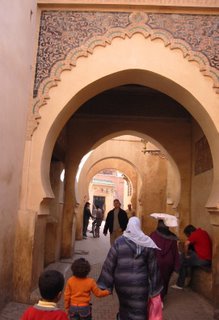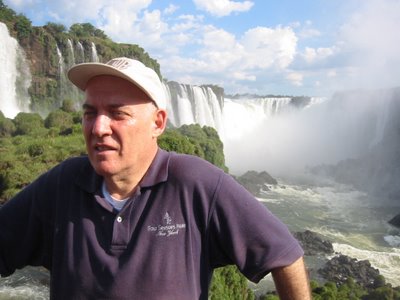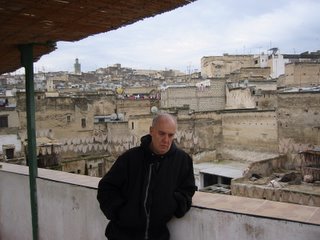
When I announced to my friends that I was going to Morocco for a few weeks in December and January, almost all of them were wary. Everyone knows I have a penchant for the kind of exotic travel that leaves most Americanos flat, but to march voluntarily into the maw of the beast??? Well, first off Morocco's pro-Western monarchy is much-loathed by primitivist and fundamentalist backers of groups like Al Qaeda and, indeed, Casablanca suffered a suicide bomb attack in May, 2003. It wasn't as damaging as the ones in New York, Bali, Madrid or London but something like 40 people died and 100 were injured. Over 2,000 people have been arrested. Velvet gloves and smiley faces or not, Morocco is a police state and a dictatorship; you don't want to run afoul of the Man in that country. Is it safe? Is New York? Is London? Is anywhere?
As for the Moroccans, they seem extremely pro-American, at least as far as I could tell. Virtually everyone I met had nothing but disdain for the Bush Regime, of course (I mean name a place that doesn't other than, perhaps, Israel, Utah and the Old Confederacy) but in terms of American culture, American ideals, and, more to the point, American people, the Moroccans are all thumbs up.
Unlike the French, British, Spanish, Portuguese and (almost) the Germans, Morocco never had a colonial problem with the Americans. Morocco was actually the first country in the world to officially recognize U.S. independence and official relations have always been good. There's a natural affinity between Moroccans and Americans. And, a little bonus, of all the Arabs anywhere, the Moroccans seem by far the least hostile towards Jews. (One Moroccan I met on this trip told me, with more pride than accuracy I think, that the first government of independent Israel was comprised mostly of Moroccan Jews.) When we first got there and people would ask where we are from I would always say "California in America." At first Roland would grimace and ask me if I was trying to get us killed-- since there are relatively few Americans traveling in Morocco and people assume when they hear English that you're a Brit-- but after a couple of days worth of huge, sincere smiles at my answer, even Roland admitted that, despite what they feel about Bush, Moroccans like Americans.
A friend of mine in the Bali tourist industry told me last year that an average American on vacation in Bali will spend five times what an average European, Japanese or Australian will spend there! I have no reason to believe the figure is substantially different for Morocco. And that kind of spending makes a lot of friends. The owner of a fancy restaurant in Marrakech told me that Americans were the only consistently good tippers, and this in one of the most esteemed restaurants in the city. (When we ate there it was full of French tourists. When the owner asked me how I liked the salads, I was extremely enthusiastic and before I could readjust myself in my seat, a complete encore of the dozen little plates of salad arrived at the table. I didn't notice that on any of the French-occupied tables around us.)
I'll tell you why I rate Morocco as a relatively safe place for tourists. It's the exponential growth of the middle class there. Morocco is a pretty rich country. Unfortunately all the wealth has been concentrated in a very few hands. Under Hassan II things started loosening up and now under his son Mohammed VI, things have really taken off. A Moroccan friend of mine told me it's because of the relaxation in once prohibitive rules about mortgages and borrowing. But whatever the reason, there appears to be a Moroccan middle class that is a lot bigger and a lot more influential than there was on any of my previous 9 trips to the country.
Marrakech might have once been scary for a typical tourist. Today Marrakech is a pretty cosmopolitan city that is very much part of the "international scene." I heard a report on the BBC about the fastest growing real estate markets in the world. I don't recall them mentioning London or Paris or Los Angeles. It was all about Shanghai and Singapore and... Marrakech! Fes still has a way to go, but even Fes, once the scariest and most forbidding city in the country, is pretty tame. Tangier has been tame far longer, but it seems very much a user-friendly blend of East-Meets-West these days.
I've been to every remote region in the country, from the kif "badlands" up in the Rif Mountains to Sidi Ifni, Ouarzazate, M'hamid and all through the High Atlas. I've always felt pretty secure and an easy-going. Exotic, yes; dangerous, nah.
UPDATE: U.S. BUILDING TORTURE PRISON IN MOROCCO; COULD SPELL BIG TROUBLE
I'll stand by what I've said about the natural affinity between Moroccans and Americans and what a safe environment I've found on my trips to Morocco. However, I found some cause for alarm in today's SUNDAY TIMES (London). "The United States is helping Morocco to build a new interrogation and detention facility for Al-Qaeda suspects near its capital, Rabat, according to western intelligence sources. The sources confirmed last week that building was under way at Ain Aouda, above a wooded gorge south of Rabat’s diplomatic district. The construction of the new compound, run by the Direction de la Securité du Territoire (DST), the Moroccan secret police, adds to a substantial body of evidence that Morocco is one of America’s principal partners in the secret 'rendition' programme in which the CIA flies prisoners to third countries for interrogation."
This isn't good news for Americans thinking about visiting Morocco because it could make tourists into targets in the minds of extremists and radicals. Non-official media in Morocco have accused the government of turning Morocco into "the CIA's dustbin."
UPDATE: APRIL, 2007-- SOME SAY THE THREAT OF TERRORISM IN MOROCCO IS VERY REAL
Morocco is not immune from a general terrorist threat in the Islamic world. And some say intricate political considerations have kept Morocco from effectively protecting itself from the scourge. Sadly, it might be something for you to take into consideration when making travel plans. Today a couple of suicide bombers blew themselves up in an attack on the U.S. consulate in Casablanca. This was hot on the heels of lethal bombings in neighbouring Algeria in which 33 people were killed by a group claiming affiliation to al-Qaeda.
One day after the latest attacks the U.S. government warned of a high risk of violence against U.S. citizens in Casablanca and advised Americans to stay at home. "The potential for violence against American interests and citizens and other Western targets remains high in Morocco," is how the State Department put it. The Khaleej Times warns that "Establishments which are readily identifiable with the United States are potential targets for attacks." Today's L.A. Times seems most concerned about the coordination of attacks in Algeria, Tunisia and Morocco with al-Qaeda. On the other hand, my friend Alisse just got back from a week in Fes-- which she loved-- and she didn't pick up on anything that seemed remotely threatening.








